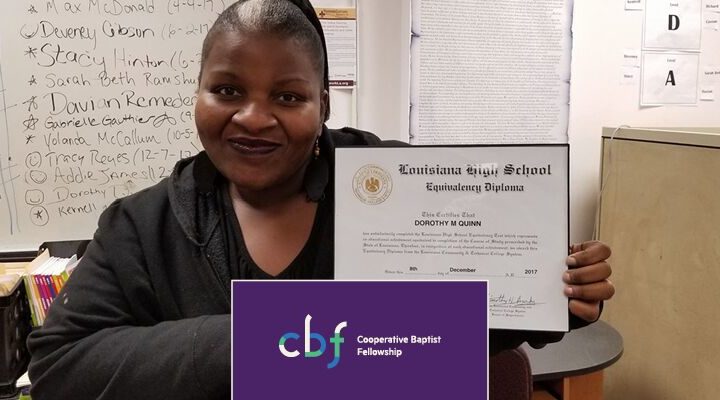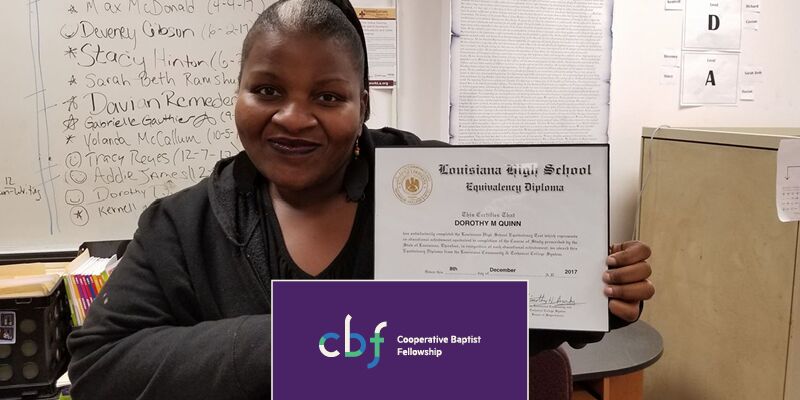Together for Hope Louisiana works to ‘disrupt cycle of rural poverty’ through GED program
By Blake Tommey
Even for the most positive rural development leaders, it’s easy to focus on what is broken, explained Marc Boswell, coordinator of Together for Hope Louisiana and asset-based development leader in the remote town of Lake Providence. TFH-Louisiana is part of the Cooperative Baptist Fellowship’s rural development coalition, Together for Hope.
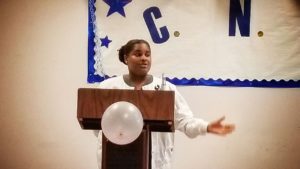
One of Marc Boswell’s first graduates from the GED program went on to become the Valedictorian of her CNA cohort.
“One of the reasons why an asset-based approach is needed is that, in most high-poverty areas — and in Lake Providence that’s about 43 percent of the population — the narrative is always about what doesn’t work, what the challenges are and those things that seem insurmountable,” said Boswell, who received his Ph.D. focusing on the intersection of race, economics and culture in American Christian theologies from Garrett Theological Seminary at Northwestern University.
“But I believe we can get more done and build more traction when we focus on the things that are already here, the institutions that certainly may not look like they do in more affluent communities, but are nevertheless incredibly strong assets.”
That’s why when Boswell sought to bolster adult job-seekers with a GED program, he approached the local community college, which operated Lake Providence’s only adult education course. Attracting and retaining educators in rural, high poverty areas, though, is a challenge for Delta communities. For the past nine months, the program had no instructor and was forced to suspend classes. Boswell, a former GED instructor and college professor, stepped in.
As he re-launched the program and engaged with students, Boswell discovered that for every adult registrant there were at least two or three more who could not attend classes. The college’s traditional daytime curriculum blocks were in direct conflict with adults who worked hourly jobs or took care of children or had no transportation. Despite the conflict, the college could not afford to keep their facilities open past 4:30 p.m., especially since adult education programs do not generate much revenue. So Boswell devised a new plan. With support from Together for Hope, Boswell rented a storefront in downtown Lake Providence and began hosting convenient evening classes for adults who could now attend.
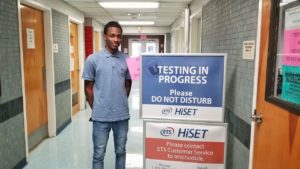
Boswell found that the closest testing site for his students was 60 miles away and worked to make Louisiana Delta Community College Lake Providence a testing site as well.
“If someone is going to find a job that pays a livable wage, that person must complete a technical program, if not a full college degree. In Lake Providence, the primary options are welding and licensed practical nursing. To enter these programs, and especially to be considered for financial aid, a student must have a GED.”
As students began attending the GED courses, Boswell discovered that the nearest testing site was 60 miles away in Bastrop and cost $90. That’s when he began partnering with Louisiana churches to build a scholarship fund, which covered the cost of GED testing with more to spare. Equipped with extra funding, Boswell and his students contacted the state testing office and successfully lobbied for a testing site in Lake Providence. In June, Lake Providence’s own campus began testing for the GED right on their home turf.
Across the landscape of rural poverty, Lake Providence still faces a familiar set of challenges with centuries-old roots, Boswell said. Slavery, Jim Crow and the fall of agricultural economies led to vast divestment in the South’s African-American and black communities. Without industry and investment, remote communities have little access to education and living-wage jobs. When you have no job, you can’t invest in a reliable vehicle. When you have no transportation, you simply cannot cover the vast distances required to work in nearby communities that may be 50 or 60 miles away.
Even when a family has a car, it often must be shared with the individual in the family who is fortunate enough to have some type of regular work. This means that others in the household still technically don’t have access to reliable transportation for their own pursuits, according to Boswell.
Despite those obstacles, Boswell explained, hope begins with education, organizing and partnering with local dedicated leaders who have been working for decades to develop the strong, resilient community of Lake Providence.
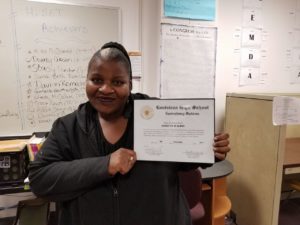
Hope begins with education, organizing and partnering with local dedicated leaders who have been working for decades to develop the strong, resilient community of Lake Providence.
“I look at all the leaders in town who are from this area and have worked tremendously hard for years, longer than I’ve been around, and I see their resolve,” Boswell said.
“They refuse to give up on this town and they continue to work together with residents of Lake Providence. It’s a humbling reminder to keep going. Things might be challenging, but for the folks who have been facing this for a long time, this isn’t anything new. And I try my best to not stop when I see the obstacles that other community leaders face, not to mention the resilience of the folks who are living in impoverished situations day in and day out.”
On August 11, two of Boswell’s former students graduated with their Certified Nursing Assistant credentials benefited from the scholarship program, assistance with transportation and availability of evening classes. Both students are examples of the hard work and persistence that occurs every day in high poverty areas, though these stories may not filter through the dominant, negative narratives, Boswell says. As for CBF’s rural development coalition, both students are also examples of the value of continued investment in Together for Hope’s work across the country. In these small but significant ways, individual cycles of poverty can be disrupted.
Learn more about and connect with Together for Hope at www.cbf.net/tfh.

